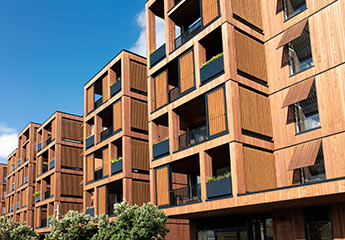This project aims to support the transition to sustainable building practices by promoting the use of biobased materials, which help mitigate climate change. Starting in 2023, the building regulations require new buildings to document their carbon footprint. To facilitate the design of biobased buildings, this project will introduce a tool for optimizing fire safety strategies based on life cycle assessments (LCA). Currently, fire safety design practices do not consider LCA in the early design stages. However, integrating LCA into the design process is crucial for achieving low-carbon buildings. The proposed tool aims to support the implementation of fire safety strategies in the iterative and flexible LCA-optimized design process, ensuring that fire safety requirements do not hinder the reduction of CO2 emissions through biobased solutions.
The tool focuses on LCA-optimized fire safety strategies for biobased buildings, for example timber structures, wood claddings, and paper insulation. It offers a performance-based design approach as an alternative to the restrictive one-size-fits-all approach of pre-accepted solutions. The tool provides generic building designs (BIM models) and guidelines to optimize LCA by incorporating fire safety considerations early in the design phase. The primary target audience includes architects and fire safety engineers, who can use the tool to comply with fire safety regulations while reducing carbon emissions. By combining LCA and fire safety engineering, this innovative tool enables a more holistic design process that informs decisions at the early stages of building design, marking a paradigm shift in the industry.
The project has three overall objectives: 1) To assess the environmental impact of fire safety strategies and their impact on the overall consequences of bio-based construction. 2) To develop a tool for the optimization of LCA-optimized fire safety strategies, guiding construction actors towards low-carbon solutions in the early design stages. 3) To demonstrate the carbon reduction potential of various fire safety strategies in accordance with Danish and international guidelines. The project's success criteria include the establishment of an environmental impact database for fire safety strategies that can be integrated into the national LCA tool for buildings (LCAByg). In addition, the project aims to publish 2-4 articles in scientific journals as well as participate in 3-6 conferences or international visits to share knowledge and results.

